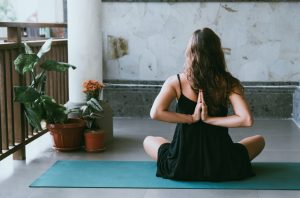As we finish up another week of social distancing and staying at home, it may feel like the days are blurring together. Here are 12 activities that you can work into your daily routine and the positive effects that each one has on the brain:
Get some exercise.
There are thousands of FREE workouts online and popular fitness locations offering workouts of all types for all fitness levels. Many require little to no gym equipment. Regular exercise can improve your memory, relieve stress, and boost your overall mood. Even just a quick 20-minute walk outside can boost your mood. If you choose to exercise outside, remember to practice social distancing and to wear a mask if possible.

Make time for stretching.
You may be spending more time sitting down in front of your computer at home without many breaks. Give your mind a mental break and stretch out stiff back muscles with stretch breaks throughout your day. Regular stretching can also reduce stress and help you refocus for a more productive workday.
Call a family member or friend.
One of the biggest challenges of social distancing is missing out on regular interactions with extended family members, friends, and community groups. Virtual calls with friends or loved ones can provide a mental boost to help you get through the day. Consider setting up virtual happy hours with coworkers or friends, weekly calls with extended family members, or sending video messages to busy family members.

Write a letter.
It’s time to break out the old stationary and track down mailing addresses. Studies show that writing has “psychological, mental, and physical health benefits.” Writing letters can help help you release stress or negative feelings, feel gratitude, and can even sharpen your memory.
Clean your home.
Cleaning your home can boost productivity and creativity allowing you to focus and get more done, according to a recent study. Studies have also shown that cleaning has a positive impact on your mental health and can help you manage stress. Cleaning also gets you up and moving.
Work on a puzzle.
Puzzles aren’t just for children. Working on a puzzle is a great way to challenge and exercise your brain. Plus, puzzles help us develop better problem solving skills, lower stress levels, and increase productivity. Word searches, Sudoku, and crossword puzzles are also great “workouts” for the brain.
Play cards.
Whether you’re playing alone or with family members in your household, card games are a great way to stimulate the brain. Studies have shown that card games, like solitaire and bridge, can improve memory and thinking skills.

Develop a new skill or hobby.
Now is the perfect time to develop a new skill or hobby. With thousands of tutorials available on YouTube, you can learn skills like knitting, reading music, gardening, yoga, or how to use a new software program while you’re at home.
Learn a new language.
Learning a second language boosts brainpower, improves memory, enhances the ability to multi-task, sharpens the mind, and enhances decision-making skills. You can choose to download a language app or find free video lessons on YouTube to help you get started.
Look for ways to serve in your community.
The coronavirus pandemic has had a devastating effect on our country and many have lost jobs and even family members. There are many ways to serve in and around North Carolina to help those hit the hardest during the pandemic. Thinking of others can reduce stress, combat depression, and can give you an increased sense of purpose.
Create something at home.
Art projects, interior design projects, cooking meals, or even creating TikTok videos can enhance brain productivity, relieve stress, and combat the depression and anxiety that you may feel during the pandemic. Simple projects will do, you do not need to be a professional to enjoy the benefits. There are also many tutorials and free art classes online to help you get started.
Listen to music.
Listening to the right kind of music can improve your memory, provide comfort, and lessen anxiety. Try out different genres to find the right music for you. You can even take it one step further by getting outside to exercise or to get your body moving by dancing to your favorite song.
Stay home and stay well during the coronavirus pandemic.